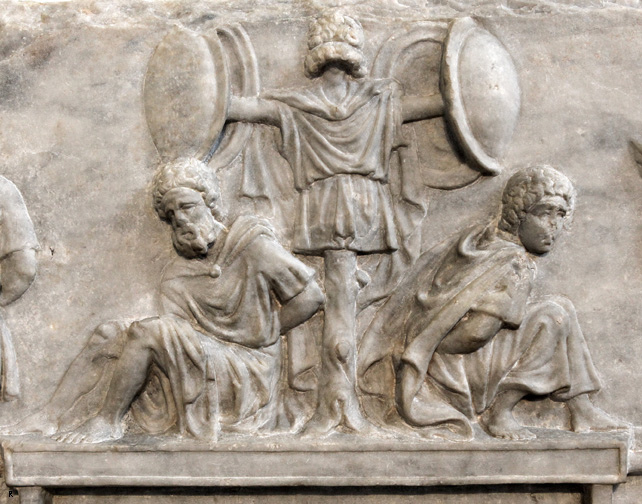Eusebius, Ecclesiastical History, bk IV:
2. For in Alexandria and in the rest of Egypt, and also in Cyrene, as if incited by some terrible and factious spirit, they rushed into seditious measures against their fellow-inhabitants, the Greeks. The insurrection increased greatly, and in the following year, while Lupus was governor of all Egypt, it developed into a war of no mean magnitude.
3. In the first attack it happened that they were victorious over the Greeks, who fled to Alexandria and imprisoned and slew the Jews that were in the city. But the Jews of Cyrene, although deprived of their aid, continued to plunder the land of Egypt and to devastate its districts, under the leadership of Lucuas. Against them the emperor sent Marcius Turbo with a foot and naval force and also with a force of cavalry.
4. He carried on the war against them for a long time and fought many battles, and slew many thousands of Jews, not only of those of Cyrene, but also of those who dwelt in Egypt and had come to the assistance of their king Lucuas.
5. But the emperor, fearing that the Jews in Mesopotamia would also make an attack upon the inhabitants of that country, commanded Lucius Quintus to clear the province of them. And he having marched against them slew a great multitude of those that dwelt there; and in consequence of his success he was made governor of Judea by the emperor. These events are recorded also in these very words by the Greek historians that have written accounts of those times.
[It has been suggested by a few historians that the figure of Anthimos in the 3rd century recension of the Acta Pauli et Antonini is a reference to Lukuas-Andreas. The discrepancy between Cassius Dio and Eusebius over the name is possibly due to the fact that he likely had a double name, both mysteriously Greek, making the equally Greek "Anthimos" a possible memory of the messianic leader. My opinion is that his Jewish name was Simeon.]
Gregory Bar Hebraeus, Chronography:
of Jerusalem, and John the Apostle, and Ignatius of Antioch were crowned (i.e. suffered martyrdom), and Plinius Pecundus, the Eparch,
killed many Christians. And when he saw how many they were, he was greatly troubled, and he wrote to Trajan, saying, ‘No other offence
can be urged against the Christians except that they do not wish to offer sacrifice to idols; they abhor adultery and murder and every disgraceful act’. And when Caesar learned these things he commanded that they should not be searched for, but that whenever any one of them was discovered he should be proceeded against until he offered sacrifice. And in the tenth year of Trajan, Galen the physician was born, and at the end of his reign the Jews who were in Cyprus uprooted the city of Salomon! (Aalamina), and slew the Greeks (Yawnaye) who were therein. And the Jews also who were in Lybia stirred up to revolt the Greeks who were therein, and thus also did the Jews who were in Cyrenaica, and in Thebes (Thebaid?), and in Alexandria and in Beth Nahrin (Mesopotamia). And the Jews who were in Egypt rebelled, and set up for themselves a king whose name was Lumpis, and he governed them and came to Judea. Now the Jews conquered in every place. And Basilides, the head of the heresy of the Gnostics, that is to say, the worshipers of the serpent, became celebrated.
Michael the Syrian, The Chronicle:




